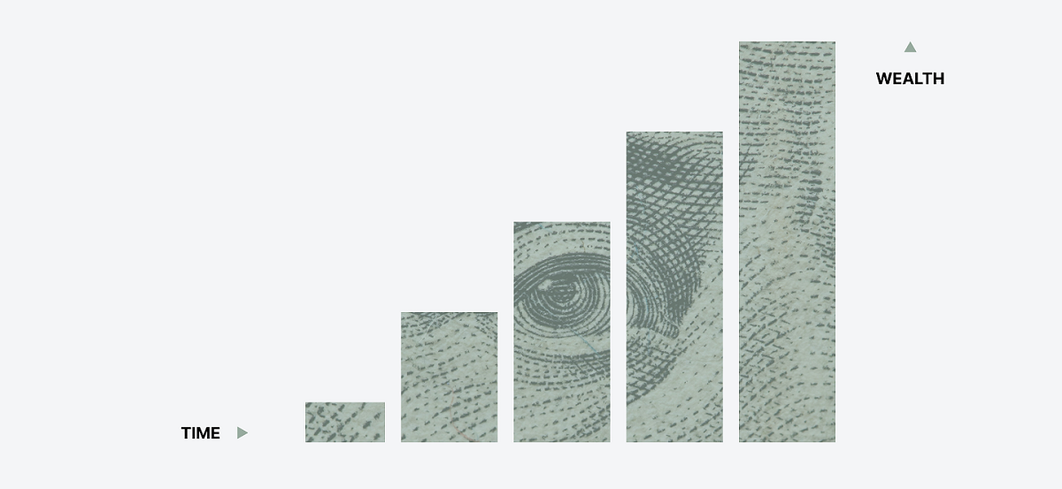
Andrew Hallam
15.09.23
How This Couple Built Wealth Without Sacrifice
_
John is a corporate executive in Dubai, where he moved to set up a better future for himself and his family. But lately, he feels like a frog in a warming pot of water. It was nice at first. But the rising cost of living and, more importantly, lifestyle inflation, is making it tough.
Lifestyle inflation is a creeping scepter. You might have high hopes to build a solid future for you and your family. But champagne brunches, expensive cars, home renovations and pricey restaurants can begin to suck us in. Before long, we’re trying to keep up with Mr. and Mrs. Jones. And they always have more.
If that sounds familiar, Sybil and Brian Hall might provide inspiration. No, they don’t likely earn a lot more than you. They were teachers at the American School of Dubai.
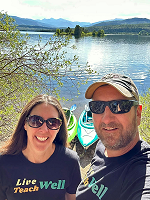
Photo: Sybil and Brian in front of their investment property on Lake Dillion, Colorado
You might think they sacrificed “the good life” to eat Kraft dinner, rent out rooms in their home and seek protein from crickets.
But they just bought experiences instead of things.
This allowed them to invest more than many corporate executives, despite earning less. They continue to add money to their globally diversified portfolio of index funds, but they no longer need to. If their money averages about 7 percent per year, these 47 year olds could easily retire at 65, without adding another penny.
“I never thought I could build wealth,” says Sybil. “I was a teacher, and I loved it, but I thought I was only working to serve my students. I thought investing was just something rich people did. I had no idea I could use investing to build freedom.”
If fulfillment were a bucket list, the Halls have filled a bathtub.
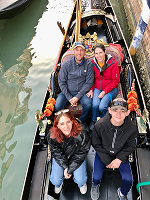
Photo: Photo: The Halls in Venice, Italy
When I caught up with them last week, they had just come back from Fiji. “We’ve been to 49 countries,” says Sybil. “Our two children had visited 32 countries by the time they were 12 and 14 years old.”
“We once vacationed in five continents over a 365 day period,” recalls Brian. “Another year, we woke up our children one morning and said, “We’re going to Disney World. Over the next nine years, we went to every Disney park in the world.”
“The best experience of our lifetime, so far, was swimming with dolphins in New Zealand,” says Sybil. “The captain of the boat saw a pod of dolphins. He got ahead of them, he blew a whistle, and we all jumped in. As the pod caught up, they played with us.”
Brian and Sybil began their overseas teaching careers in Rome, Italy. They’ve also worked in the United States, Shanghai, Dubai and Brussels.
Get International Investing insights
in your inbox once per month
“We didn’t perceive our journey towards financial freedom as a series of sacrifices,” says Sybil. “In fact, it was quite the opposite. Taking charge of creating the future we desired for our family became a passionate pursuit. But we didn’t give up anything that gave us joy, like traveling the world with our family, swimming with dolphins, planting trees in Belgium, exploring the pyramids, or staying at luxurious hotels in Asia. Achieving financial freedom meant making adjustments, like reducing excessive dining out, but it's all about how you frame it.”
They’ve also done several service learning trips with their children. “We’ve gone to a Giant Panda research center in China,” recalls Brian.
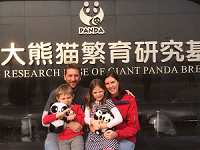
Photo: The Halls at a Panda Research Center in China
“And our daughter has worked with elephants in Thailand.”
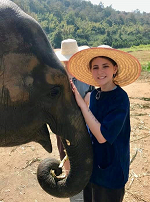
Photo: Carina Hall in Thailand
In their book, Happy Money, psychology professors Elizabeth Dunn (from the University of British Columbia) and Michael Norton (a psychologist at Harvard) says we should use behavioural science to determine how to spend our money for the biggest impact on our happiness. We might say, “I get so much pleasure dining out at expensive restaurants every week,” but in most cases, research says that isn’t true. When we eat out too frequently, it ceases to be a treat. We get used to it. We also get used to the cars we drive.
But enjoying novel experiences with people we love is something we don’t forget.
There’s an important distinction here. On our deathbeds, when looking back on our lives, will we say, “I wish I bought that new Maserati back in 2024?” “I wish I remodeled that bathroom.” “I wish I worked longer hours.” “I wish I went to more champagne brunches.”
You might say those things. But I doubt it.
Former palliative care nurse, Bronnie Ware, says none of those things are among people’s top regrets. In her book, The Top Five Regrets of the Dying, she says we regret missing out on experiences. Our regrets are also relationship-based. Are you maximizing time with the people you love?
With smart financial planning, smart investing and smart spending, you can limit those regrets and get the most out of life…much like Sybil and Brian Hall.
Andrew Hallam is a Digital Nomad. He’s the bestselling author Balance: How to Invest and Spend for Happiness, Health and Wealth. He also wrote Millionaire Teacher and Millionaire Expat: How To Build Wealth Living Overseas
Swissquote Bank Europe S.A. accepts no responsibility for the content of this report and makes no warranty as to its accuracy of completeness. This report is not intended to be financial advice, or a recommendation for any investment or investment strategy. The information is prepared for general information only, and as such, the specific needs, investment objectives or financial situation of any particular user have not been taken into consideration. Opinions expressed are those of the author, not Swissquote Bank Europe and Swissquote Bank Europe accepts no liability for any loss caused by the use of this information. This report contains information produced by a third party that has been remunerated by Swissquote Bank Europe.
Please note the value of investments can go down as well as up, and you may not get back all the money that you invest. Past performance is no guarantee of future results.
